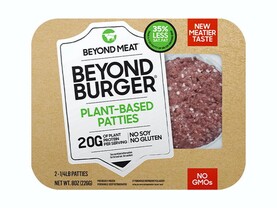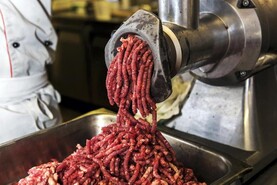A new dairy export programme funded by the Dairy Council for Northern Ireland (DCNI) and the European Union (EU) will get under way next week with representatives from Dale Farm, Fane Valley and Pritchitts joining over 2,700 international exhibitors at SIAL China in Shanghai.
The export programme is a three-year initiative worth €625,000, with 50% of the funding coming from the EU and the rest from the Dairy Council. It was first publicised last October and formally launched by Enterprise Minister Arlene Foster this week.
As well as attending SIAL China, there are plans for local companies to exhibit at Prodexpo in Moscow in 2016 (assuming that progress is made on ending the Russian ban on EU dairy products). It is also hoped that the industry here will be able to engage with buyers of dairy produce from Russia, southeast Asia and the Middle East.
Sixteen senior executives from companies in these regions have been identified by Dale Farm, Fane Valley, Pritchitts and Glanbia Cheese and will be invited to Northern Ireland between 8 and 10 June.
A second inward visit by company executives based in countries such as Taiwan and Kuwait is also planned, while the Dairy Council intends bringing over three journalists from target countries to see what NI has to offer. Similar initiatives will be conducted in 2016 and 2017.
It is all part of a campaign to drive sales of local produce to new customers in third country markets.
Speaking at the launch in Stormont this week, Dr Mike Johnston, chief executive of the Dairy Council, said he recognised that the initiative was against the backdrop of a depressed world market for dairy products.
“Volatility is now a fact of life. There will be an increased focus over the next few years on mitigating the effects of volatility. One way to do this is to develop long-term relationships with new customers,” he said.
Support
To support the initiative, a dedicated website will be available, while a DVD showcasing the NI dairy industry has also been produced. That DVD focuses heavily on the traceability of local dairy products, our grass base, family farm structure, abundance of water, regulation and inspection to ensure that our produce is safe and the work being done to reduce the carbon footprint.
The aim of the DVD is to reinforce the message that product from NI is safe and environmentally and economically sustainable – key issues for customers looking to develop long-term relationships.
Developing these relationships with customers in countries such as China takes time, patience and persistence by local processors, but the end result is potentially rewarding.
Also speaking at the event in Stormont, the Chinese Consul General in Belfast, Wang Shuying, said that dairy consumption is growing rapidly in China and they will import more from the EU, including NI, in the future.
In the four months that she has been based in Belfast, Shuying maintained that she has been increasingly impressed by the safety and quality of local food. She is seen as a key figure in NI getting more access to China across the various sectors, including dairy.
Voicing her support for the Dairy Council initiative, Enterprise Minister Arlene Foster said: “Engagement between Government, the dairy sector and trade bodies is vital as we look to promote the quality of Northern Ireland’s dairy produce to emerging markets and facilitate the development of new business. My department will continue to work with the Dairy Council for Northern Ireland to explore initiatives, such as the third country export programme.
‘‘With the removal of milk quotas and increased volatility in dairy markets, it is more important than ever that the industry finds new high-value markets for NI milk products outside the EU,” the Minister said.
The Dairy Industry Newsletter (DIN) has reported that the average EU milk price of the past 20 years has been nearly 30c/kg (around 30c/litre). Coincidentally, that is very close to the current prices in Northern Ireland.
The peak-to-trough variation over the past 20 years in the EU average milk price has been 35%. In NI, the variance has been more than that but nothing like what it could be in future with fuller exposure to world markets.
The DIN reports that the peak-to-trough variance in farm-gate milk prices in the USA over the past 20 years has been 100% (presumably meaning that prices have doubled or halved from time to time). That may seem bad enough but, in New Zealand, the variation has been 180%, according to DIN. This indicates that the price has almost trebled in good times when compared with times of low prices and has presumably dropped by almost two-thirds from its peak when supply exceeds demand.
Auction
In 2014, the Global Dairy Trade internet auction average prices for whole milk powder fell from over US$5,000/t to around $2,200/t.
As the European Union has dismantled or profoundly weakened its former support systems, the market for milk within the EU has become much more liable to fluctuate as it has done for decades in the USA and New Zealand.






 This is a subscriber-only article
This is a subscriber-only article










SHARING OPTIONS: